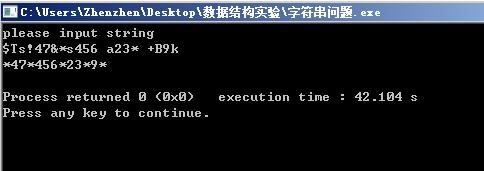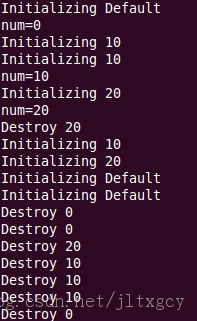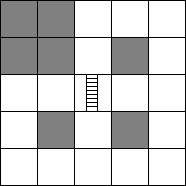树中两个结点的最低公共祖先
题目描述:
给定一棵树,同时给出树中的两个结点,求它们的最低公共祖先。
输入:
输入可能包含多个测试样例。
对于每个测试案例,输入的第一行为一个数n(0<n<1000),代表测试样例的个数。
其中每个测试样例包括两行,第一行为一个二叉树的先序遍历序列,其中左右子树若为空则用0代替,其中二叉树的结点个数node_num<10000。
第二行为树中的两个结点的值m1与m2(0<m1,m2<10000)。
输出:
对应每个测试案例,
输出给定的树中两个结点的最低公共祖先结点的值,若两个给定结点无最低公共祖先,则输出“My God”。
样例输入:
2
1 2 4 6 0 0 7 0 0 5 8 0 0 9 0 0 3 0 0
6 8
1 2 4 6 0 0 7 0 0 5 8 0 0 9 0 0 3 0 0
6 12样例输出:
2
My God
#include <cstdio>
#include <iostream>
#include <list>
using namespace std;
struct Node{
int x;
struct Node *left;
struct Node *right;
};
int path1[10000],path2[10000];
int top1 = -1,top2 = -1;
void createTree(Node *&root){
int x;
scanf("%d",&x);
if(!x)
root = NULL;
else{
root = new Node;
root->x = x;
createTree(root->left);
createTree(root->right);
}
}
bool getPath(Node *root,int x,int path[],int &top){
path[++top] = root->x;
if(root->x == x)
return true;
bool found = false;
if(root->left)
found = getPath(root->left,x,path,top);
if(!found && root->right)
found = getPath(root->right,x,path,top);
if(!found)
top--;
return found;
}
int getCommonNode(int path1[],int path2[]){
int x;
int i = 0,j = 0;
while(i <= top1 && j <= top2){
if(path1[i] == path2[j])
x = path1[i];
i++;j++;
}
return x;
}
void destory(Node *&root){
if(root){
destory(root->left);
destory(root->right);
delete root;
root = NULL;
}
}
void print(Node *root){
if(root){
printf("%d ",root->x);
print(root->left);
print(root->right);
}
}
int main(int argc, char const *argv[])
{
int n,a,b;
while(scanf("%d",&n) != EOF){
while(n--){
Node *root;
createTree(root);
scanf("%d %d",&a,&b);
top1 = -1;top2 = -1;
if(!getPath(root,a,path1,top1)){
printf("My God\n");
continue;
}
if(!getPath(root,b,path2,top2)){
printf("My God\n");
continue;
}
destory(root);
printf("%d\n",getCommonNode(path1,path2));
}
}
return 0;
}
#include <cstdio>
#include <iostream>
#include <list>
using namespace std;
struct Node{
int x;
struct Node *left;
struct Node *right;
};
int path1[10000],path2[10000];
int top1 = -1,top2 = -1;
void createTree(Node *&root){
int x;
scanf("%d",&x);
if(!x)
root = NULL;
else{
root = new Node;
root->x = x;
createTree(root->left);
createTree(root->right);
}
}
bool getPath(Node *root,int x,int path[],int &top){
path[++top] = root->x;
if(root->x == x)
return true;
bool found = false;
if(root->left)
found = getPath(root->left,x,path,top);
if(!found && root->right)
found = getPath(root->right,x,path,top);
if(!found)
top--;
return found;
}
int getCommonNode(int path1[],int path2[]){
int x;
int i = 0,j = 0;
while(i <= top1 && j <= top2){
if(path1[i] == path2[j])
x = path1[i];
i++;j++;
}
return x;
}
void destory(Node *&root){
if(root){
destory(root->left);
destory(root->right);
delete root;
root = NULL;
}
}
void print(Node *root){
if(root){
printf("%d ",root->x);
print(root->left);
print(root->right);
}
}
int main(int argc, char const *argv[])
{
int n,a,b;
while(scanf("%d",&n) != EOF){
while(n--){
Node *root;
createTree(root);
scanf("%d %d",&a,&b);
top1 = -1;top2 = -1;
if(!getPath(root,a,path1,top1)){
printf("My God\n");
continue;
}
if(!getPath(root,b,path2,top2)){
printf("My God\n");
continue;
}
destory(root);
printf("%d\n",getCommonNode(path1,path2));
}
}
return 0;
}
补充:软件开发 , C++ ,




